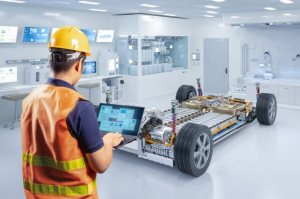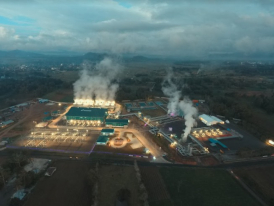Half a Century of SMBR: Looks to the future amidst pressured national cement industry
Cement producer PT Semen Baturaja (SMBR), a subsidiary of PT Semen Indonesia Group (SIG), is determined to focus on strategic measures to keep up its competitiveness and operational sustainability as well as manage excess production capacity, tight competition and the need for efficiency.
Trade and State-owned Enterprises (SOEs) Commission VI of the House of Representatives (DPR) has paid special attention to the operational holding structure implemented by SIG since 2018, considering this model as too centralized and reducing the flexibility of subsidiaries in managing production, marketing and finance.
"PT Semen Padang, for example, experienced a decline in the market in West Sumatra due to this policy," Deputy Chairman of Commission VI, Andre Rosiade, said during a hearing with SIG Management on December 4, 2024.
Andre pushed for the operational holding to be converted into a strategic holding, where SIG only sets targets and performance indicators, while subsidiaries are given greater autonomy.
This challenge is not only experienced by Semen Padang, but also by other subsidiaries, including SMBR. The increasingly tight competition from domestic and foreign competitors is a real test for all entities under SIG.
The integration of SMBR into SIG was initially considered a breath of fresh air for the national building materials sector as it opens up great opportunities to increase SMBR's efficiency, productivity, and competitiveness in domestic and regional cement markets.
Minister of SOEs Erick Thohir, called this integration a strategic step to create significant value creation, especially in facing the challenges of the global economy which is full of uncertainty.
One of the main benefits of this integration is the increase in SMBR factory utilization. Currently, the market capacity in South Sumatra reaches 6 million tons, while SMBR is only able to meet 2.1 million tons. With integration, SMBR is projected to increase its capacity up to nearly 3 million tons. This will bring SMBR closer to market control of 50 percent or more, making it a dominant player in the South Sumatra region.
Productivity
SIG President Director, Donny Arsal, said that productivity per worker can increase from 3 tons to 5-6 tons. Integration also opens up opportunities to reduce production costs through efficiency and effectiveness of management, such as reducing the cost of procuring raw materials.
SMBR's location, which is close to coal sources, such as Bukit Asam, is a strategic advantage that is difficult to compete with. SMBR does not require fuel transportation by sea, which requires high costs. In addition, the transition to solar energy through Solar Power Plants (PLTS) further strengthens SMBR's position as a producer that is oriented towards sustainability.
In the context of energy, coal is projected to remain the main energy source for the next 10 years. This provides an additional advantage for SMBR to remain competitive in the market with lower energy costs compared to its competitors.
Donny said that this integration gives SMBR a luxury of price competitiveness, given the lower production costs. With the integration, SMBR no longer has to compete with its "own brothers" under the SIG umbrella, but instead focuses on facing non-SOE competitors.
Donny explained that this integration also provides the potential for great synergy in strengthening the position of SOES’ Cement Sub-Cluster. This step is expected to increase SIG's footprint in the Sumatra region, which is the second largest domestic market after Java.
Financial support and governance
From a financial perspective, integration into SIG provides SMBR with greater bargaining power in financial restructuring and risk management.
Tubagus Muhammad Dharury, then SMBR's Director of Finance and Risk Management, said that this integration allows for more efficient large-scale procurement of goods, while citing that centralized procurement of cement bags through SIG can reduce costs by up to 30 percent
The governance aspect also receives great attention. As a public company, SMBR continues to strengthen the implementation of Good Corporate Governance (GCG), including transparency of financial reports and mitigation of operational risks. The integration process is also managed with harmonization between various parties, starting from the Ogan Komering Ulu Regency Administration to related agencies in South Sumatra and Lampung.
This integration process culminated on December 19, 2022, when the government officially transferred the shares of the Republic of Indonesia amounting to 7,499,999,999 Series B shares into SIG shares, representing 75.51 percent of all issued and fully paid-up capital in SMBR.
Donny Arsal emphasized this integration as a major step that not only strengthens SIG's position as the leader of the cement industry in Indonesia, but also supports SMBR's vision as a leading provider of building material solutions in the region. A synergy between SIG andSMBR is expected to win tight competition in the cement industry.
The integration of SMBR into SIG is evidence of strategic transformation of SOEs to face increasingly complex market dynamics.
With geographical advantages, energy efficiency, and strong support from SIG, SMBR is now on track to not only maintain its existence, but also make a major contribution to national development. This step confirms the commitment of SMBR and SIG to create sustainable added value for the community and the country.
Optimism
Entering 2025, SMBR is optimistic about taking advantage of opportunities from government programs that focus on infrastructure development.
“The program to build 3 million houses and exemption from taxes imposed on the acquisition of land or building rights (BPHTB) for certain categories will be the main drivers of cement demand,” Suherman said.
Based on data from the South Sumatra Provincial Housing and Settlement Agency, families who do not have a house, with a backlog reaching 340,256 Families (KK) or around 17 percent of the total 2,014,081 families in South Sumatra. This, along with other government projects, also has the potential to drive the demand side of cement.
At the national level, cement demand is projected to grow 1 percent in 2025, with the industrial utilization rate increasing by 1 percent compared to 2023. Although utilization is still below pre-pandemic levels, the prospects for cement industry recovery look positive.
To face market competition, SMBR is also strengthening the contribution of non-cement products such as white clay and limestone. In addition, the company produces Portland Composite Cement (PCC), which is environmentally friendly and has been awarded with Green Label by the Green Product Council Indonesia.
PCC uses materials that reduce carbon emissions by up to 38 percent compared to conventional cement. With a Domestic Component Level (TKDN) reaching 89.34 percent, this product far exceeds the minimum limit set by the government, which is 40 percent.
“With these various strategic efforts, SMBR not only supports national development but is also committed to reducing environmental impacts. We are confident that this measure will ensure that the company’s performance remains positive in the future,” Suherman concluded.
Already have an account? Sign In
-
Start reading
Freemium
-
Monthly Subscription
30% OFF$26.03
$37.19/MonthCancel anytime
This offer is open to all new subscribers!
Subscribe now -
Yearly Subscription
33% OFF$228.13
$340.5/YearCancel anytime
This offer is open to all new subscribers!
Subscribe now






